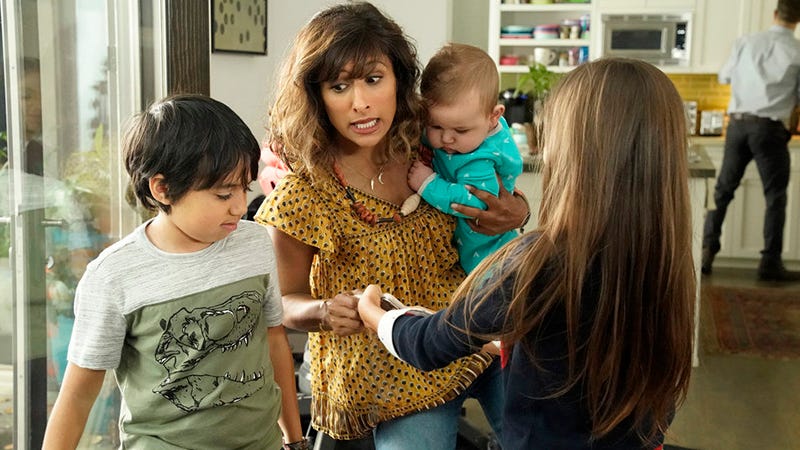Join or Sign In
Sign in to customize your TV listings
By joining TV Guide, you agree to our Terms of Use and acknowledge the data practices in our Privacy Policy.
I Feel Bad: Emet's Workplace Hurts What Makes the Show Great
The show's unique perspective is watered down when Emet goes to work
The Amy Poehler-produced I Feel Badlooks familiar. Like ABC's other successful family comedies, Fresh off the Boat and black-ish, I Feel Bad centers on the kind of family that Roseanne's the Conners would use as a plot point to teach a valuable lesson. Created by Aseem Batra and starring Sarayu Rao, the culture clash of this mixed-race Indian-American family is obvious fodder for comedy. That's why it feels so surprising when the show flips into workplace sitcom mode with the introduction of Emet's (Rao) coworkers at the gaming company she works for.
The introduction of Emet's coworkers -- more accurately described as Emet's work children -- is set up in the pilot to offer a contrast to her home life. At home she's loved and respected if not listened to. At work she is neither loved, nor respected, or listened to. At first, the three comedy heavyweights -- the UCB-trained Zach Cherry, Inbetweeners star James Buckley, and American stand-up Johnny Pemberton -- are typical nerdbros. They're set up as people who don't really understand or care to understand women; In the pilot, they're dealing with what a sexy but realistic female character in a video game should look like. In the second episode, Norman (Cherry) is stuck hanging off a climbing wall where the handhold he has happens to be a woman's nipple.
Fall TV Popularity Contest: Did I Feel Bad Make You Feel Good About Its Chances?
Thankfully by the third episode, the three start to turn away from lowbrow, sexist gaming bros into more three-dimensional characters that actual show off their comedy chops. They design a character that Emet's daughter would actually play in a video game. They help Emet try to balance life and work better, despite still demanding her attention as their work mom. And in the most bizarre turn of events, they have storylines that completely separate from Emet altogether. There's approximately seven minutes of a 23-minute sitcom dedicated to the guys breaking into the roof deck, a luxury in their office building that they, as peons of a lower floor, don't have access to.
While that storyline does have its moments of genuine humor, it deeply unbalances the show to spend that much time away from its protagonist, particularly because work in this case never ties back to Emet's perspective in any way. While the boys are hunting down their white whale, Emet is busy with her home life, where the laughs are coming from the culture clashes that Emet herself experiences. And that's where the true humor of the show lies.

Emet is a first-generation Indian-American daughter raised by two Indian immigrants (played by the legendary Madhur Jaffrey and Brian George). She's married to a white man (Paul Adelstien) and is raising three mixed-race children who each break her expectations -- and the audience's stereotypes -- in different ways. The members of the Kamala-Sweetzer family constantly surprise each other, and in a great twist that lends itself to punching up, the surprises come from the cultural things they do have in common (and have likely unconsciously taught each other) rather than the things that don't. In fact, the best laugh of the three episodes we've seen so far have come from Maya (Jaffrey) and Sonny (George) when they stay at Emet's house and end up going through Emet and David's (Adelstien) closet, toying with their clothes and mocking the couple's "perfectness." It's a perfect mirror image of what David and Emet do at their neighbor's house -- a married couple with no kids and lots of money to burn which makes them so, so bougie and so, so mockable.
It's in these tiny moments of connection -- even unrecognized connection -- that I Feel Bad truly shines. The fact that it spends so much time at the workplace without its star dilutes what could be one of the only meaningful takes on a modern mixed-race family on broadcast television. After all, Roseanne's black granddaughter was never really heard, only seen, whereas everyone in the Kamala-Sweetzer family demands your entire attention.
And that's not to say that Emet's life can't be well-rounded -- or at least attempt to be well-rounded. The audience should see her at work, should watch what it takes to acquit herself in a male-dominated industry. But like black-ish, the secondary characters of the workplace should stay just that: secondary to Emet's perspective, goals, and understanding of whatever wrench is thrown her way that week.
Ironically, by trying to have it all, a credo that is the antithesis of the show, I Feel Bad waters itself down. It's got all the building blocks in place to be one of the best comedies of the season: a stellar cast, a unique perspective of American families, and a comedy pedigree worth paying attention to. If it backs away from trying to put the all in all-American, then it'll be a lasting hit.
I Feel Bad airs on Thursdays on NBC at 9:30/8:30c.
